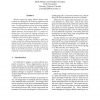Free Online Productivity Tools
i2Speak
i2Symbol
i2OCR
iTex2Img
iWeb2Print
iWeb2Shot
i2Type
iPdf2Split
iPdf2Merge
i2Bopomofo
i2Arabic
i2Style
i2Image
i2PDF
iLatex2Rtf
Sci2ools
110
click to vote
WCRE
2007
IEEE
2007
IEEE
Lossless Comparison of Nested Software Decompositions
Reverse engineering legacy software systems often involves the employment of clustering algorithms that automatically decompose a software system into subsystems. The decompositions created by existing software clustering algorithms are often nested, i.e. subsystems may contain other finer-grained subsystems as well as system resources, such as source files. It is rather surprising then, that almost all existing methods for decomposition comparison assume flat decompositions, i.e. subsystems only contain system resources. In this paper, we introduce UpMoJo, a novel comparison method for software decompositions that can be applied to both nested and flat decompositions. The benefits of utilizing this method are presented in both analytical and experimental fashion. We also compare UpMoJo to the END framework, the only other existing method for nested decomposition comparison.
| Added | 04 Jun 2010 |
| Updated | 04 Jun 2010 |
| Type | Conference |
| Year | 2007 |
| Where | WCRE |
| Authors | Mark Shtern, Vassilios Tzerpos |
Comments (0)

